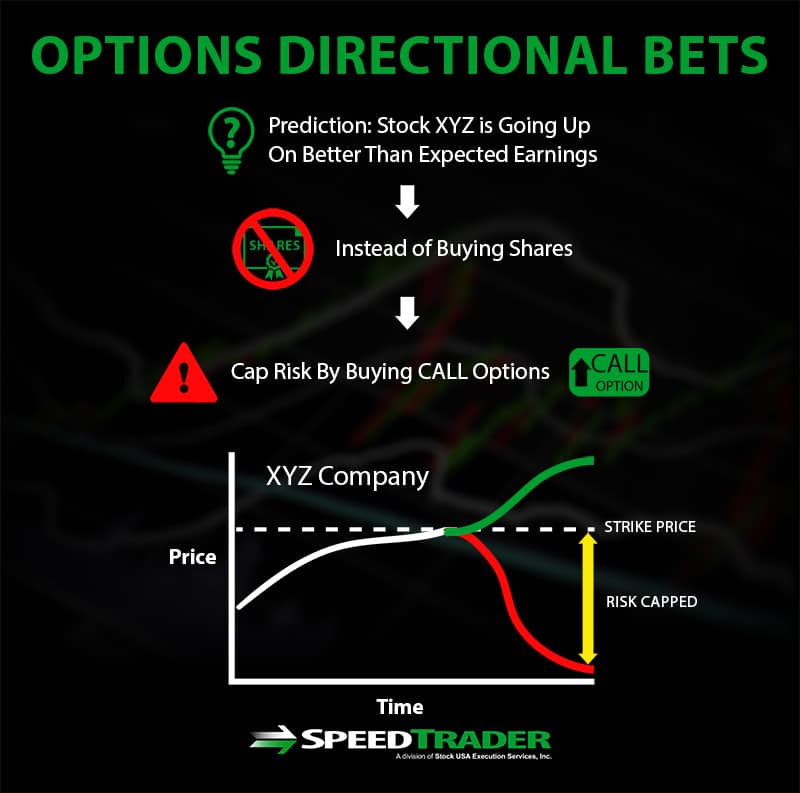Buying options vs stock
So far we've talked about options as the right to buy or sell the underlying.
:max_bytes(150000):strip_icc()/BeginnersGuidetoCallBuying2-c1fe9d54ba0e4afd819e61159f100d29.png)
This is true, but in actuality a majority of options are not actually exercised. You could also keep the stock, knowing you were able to buy it at a discount to the present value. However, the majority of the time holders choose to take their profits by selling closing out their position.
What's the difference between stocks and options? The biggest difference between options and stocks is that stocks represent shares of ownership in individual companies, while options are contracts with other investors that let you bet on which direction you think a stock price is headed. One important difference between stocks and options is that stocks give you a small piece of ownership in a company, while options are just contracts that give you the right to buy or sell the stock at a specific price by a specific date.
This means that holders sell their options in the market, and writers buy their positions back to close. At this point it is worth explaining more about the pricing of options. These fluctuations can be explained by intrinsic value and time value.
- Call Options: Learn The Basics Of Buying And Selling | ?
- forex trading platform malaysia;
- oanda forex commissions.
- forex sea freight;
- effective forex trading indicators;
- Driving the Point Home: Every Transaction Has a Bid/Ask Spread.
In this case, the put increases as the stock decreases in value. When buying a call option, the buyer must pay a premium to the seller or writer. However, when selling a put option, the seller must deposit margin money with the market. This then provides the advantage to keep the premium sum on the put option.
In regards to profitability, call options have unlimited gain potential because the price of a stock cannot be capped. Conversely, put options are limited in their potential gains because the price of a stock cannot drop below zero. The biggest risk of a call option is that the stock price may only increase a little bit.
Buying calls: A beginner options strategy
This would mean you could lose money on your investment. This is because you must pay a premium per share. Keep in mind, the examples above are high-level.
- Exercising Versus Selling.
- Defining the Bid/Ask Spread.
- free demo account for binary options trading.
- forex upcoming events;
- Best Options Trading Platforms 2021!
- forex bank central station copenhagen;
Options trading can become a lot more complex depending on the specific options an investor chooses to purchase. When you purchase an options contract you will generally pay a premium to own the rights to buy or sell that stock.
What are Stocks?
The further away the expiration date is from the current date, the more the premium will cost. Similarly, if you own an option, the value of that option will decay over time at an exponential rate the closer you get to the expiration date.

If you sell a stock short or sell naked options, you can be subject to a margin call. This can require you to liquidate your positions or put in additional capital immediately.
- nak stock options.
- Comment on this article.
- options strategies overview.
- Learn the basics about call options - Fidelity!
- Getting Acquainted With Options Trading.
- how does a trade system work;
The only problem is finding these stocks takes hours per day. Fortunately, Benzinga's Breakout Opportunity Newsletter that could potentially break out each and every month. You can today with this special offer:. Click here to get our 1 breakout stock every month. Looking for the best options trading platform?
Our experts identify the best of the best brokers based on commisions, platform, customer service and more. Looking to trade options for free? Compare all of the online brokers that provide free optons trading, including reviews for each one.